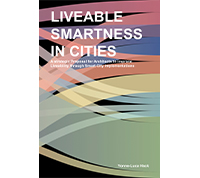LIVEABLE SMARTNESS IN CITIES

Smart city projects hold the hope of solving multiple urban problems by collecting and analysing data to improve systems’ efficiency and liveability. The foundation of this master thesis is the lack of focus on smart city developments in architecture. More specifically, it aims to synthesize the academic discourses on liveability and smart cities. Furthermore, it researches the role of architects and proposes strategies for future influence on smart cities. A systematic literature review examines the connection of liveability and smart cities in peer-reviewed publications. The integration of the most important findings leads to a three-dimensional ‘Liveable Smartness’ model. It provides a fundamental understanding of spatial, organisational, and social categories for smart city implementations that foster liveability.
Based on this model, large tech companies and smart city projects in the EU (Lyon, Munich, Vienna) are analysed. Additionally, an evaluation of six architecture schools in the DACH-region (Germany, Austria, Switzerland) indicates the current and potential future influence of the architectural profession on Liveable Smartness. In integrating the results, the thesis concludes with five principles that can help adapting the education of future architects towards Liveable Smartness: think interdisciplinary, collaborate in projects, use technology, work scientifically, and know your talent.
Published by: TUM Department of Architecture, Chair for Architectural Informatics (Prof. Dr.-Ing. Frank Petzold) and Chair of Urban Development (Prof. Dr. Alain Thierstein)
Author: Hack, Yonne-Luca
ISBN: 978-3-948278-04-5